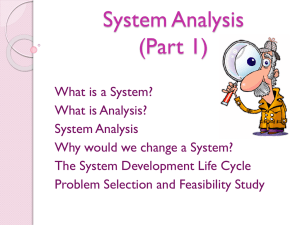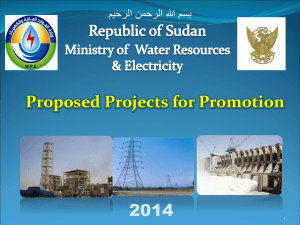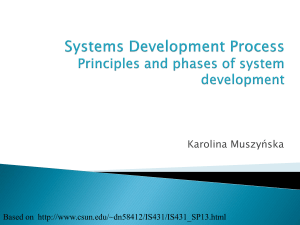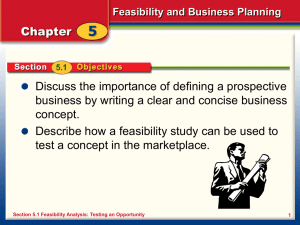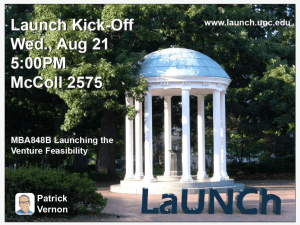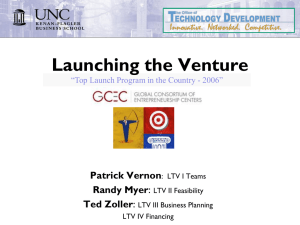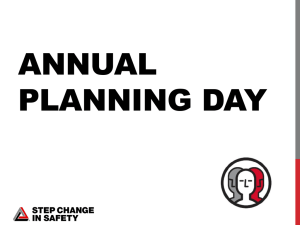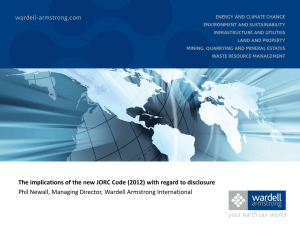Essential in the Creation of Cooperatives
advertisement
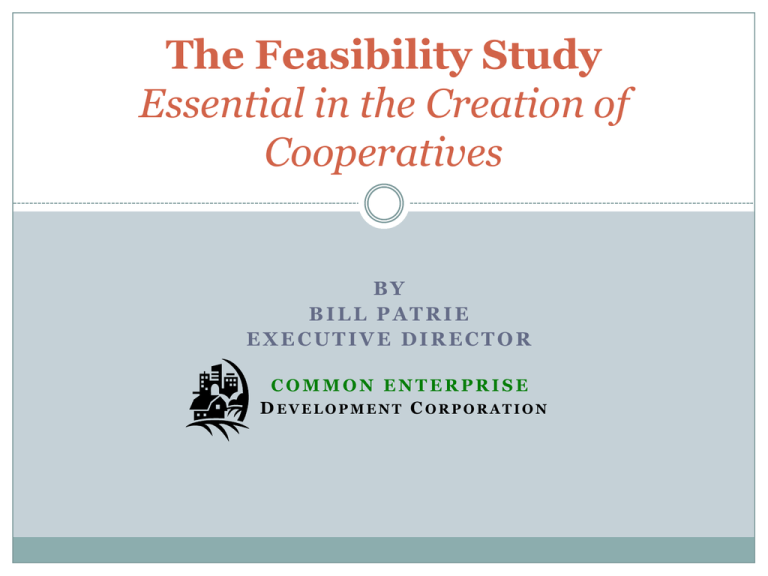
The Feasibility Study Essential in the Creation of Cooperatives BY BILL PATRIE EXECUTIVE DIRECTOR COMMON ENTERPRISE D EVELOPMENT CORPORATION Feasibility Study - Examples Feasibility studies can focus on production, marking, geographic areas and products. Examples from my works have included… The feasibility of… a soybean oil based bio-diesel plant within a 100 mile radius of Fargo, ND a canola oil based bio-diesel plant at Minot, ND a beef based meat canning plant at Bismarck, ND production and processing and marketing of natural beef using a New Zealand style processing plant marketing natural lamb products finishing feeder pigs to finish weights in Southwest North Dakota using barley crushing sunflower seeds and marketing the oil burning city garbage to produce steam to heat 66 businesses in Devils Lake, ND using wind driven generators to power a rural water system on the Turtle Mountain Indian Reservation the residents of a mobile home park purchasing the park from the owner and operating it as a resident owned community a beef feed lot in Southwestern North Dakota a beef feed lot next to an ethanol plant in North Eastern North Dakota a wheat gluten plant cracking and drying eggs and selling dried egg products from a plant in Devils Lake, ND processing and marketing beef using the Halal protocol Feasibility Study - Fundamentals Timing is everything. Needs to follow the full development of the steering committee and the project champion. Requires an “owner” commitment—skin in the game. More examples of feasibility studies… Pelleting of alfalfa—multiple studies The conversion of barley to ethanol The conversion of corn to ethanol The co-location of a corn ethanol plant to a gasoline refinery The co-location of an ethanol plant with a coal fired power plant The production and marketing of tilapia fish using the cooling water of a power plant The production and wholesale marketing of roses in a greenhouse heated by waste heat from a power plant The production and marketing of farm raised tilapia fish Feasibility Study - Fundamentals Passive feasibility studies are a waste of time—who wants to know the answer and how they intend to use it are as important as the question of feasibility itself. Requires a methodology and a discipline akin to engineering and the scientific method. Must be an interactive learning process for the steering committee. Feasibility Study – Fundamentals Feasibility studies age quickly—be prepared to act on the study in 60 days. Use a firm with an honest reputation—it is very expensive to have a firm learn on your money. Use the learning as you are learning it to fashion market entry strategies (who might be our partners, competitors, suppliers, etc) Examples of feasibility studies… The aggregation and cooperative marketing of feeder calves on the Ft. Berthold Indian Reservation The production and marketing of hogs in hoop barns on the Spirit Lake Indian Reservation The production and marketing of heirloom seeds on the Spirit Lake Reservation The production, processing and utilization of vegetables through tribally controlled institutions at Spirit Lake The collective distribution and retail marketing of Pride of Dakota member products Feasibility Study – Learning about the business Purpose is learning at two levels. Do I want to be in this business? Do I have the opportunity to get in? Is entering this business something average, normal, everyday people can do our does it require skills and resources beyond our ability to procure? Examples of feasibility studies… The production, processing and marketing of rabbits in the United States and Canada The purchase and operation of US West telephone service lines by telephone cooperatives and independent phone companies The manufacture and marketing of wheat based tortillas in eastern North Dakota The formation of a pork producer cooperative to supply and process hogs for Cloverdale Foods, Inc. The value of the Cloverdale label to retail grocery stores The discounted future earnings value of Cloverdale Foods, Inc. Minot packing plant Feasibility Study - Process Gaining industry knowledge by a consultant is necessary. Self studies can work if those performing the work are committed to objectivity (natural food cooperatives) and have a study template. Beware the conflicted consultant (engineering firm, building contractor, equipment sales firm, etc) Feasibility Study – Learning about the Industry Pay attention to the operating parameters such as the minimum size, the amount of equity and debt, the skill levels of management and staff. Is the industry expanding or contracting? How about the changes in technology? Who are the existing players and how will a new company be accepted? Examples of feasibility studies… The feasibility of milling corn into high fructose corn syrup The feasibility of growing storing and marketing potatoes in Stutsman and surrounding counties in Central ND The feasibility of producing and marketing frozen French fries in Central North Dakota The feasibility of a pasta plant in Northwest North Dakota The feasibility of a pasta plant in the Northern Red River Valley of ND The production and marketing of partially baked bread from eastern ND The production processing and marketing of garlic Feasibility Study - Process Sometimes a pre-feasibility study is the better approach—do we really want to build a ship in the desert? Studies should be sequential—market studies precede—the study of the technology to produce a project. Establish go-no go-decision points in the study with the steering committee. Feasibility Study - Process Ask for and get the research materials—notes, interviews, consulted publications etc. Do the feasibility study with the business plan in mind—can we generate return on equity or return on investment projections? Test the assumptions in the study with other industry experts Do the market prices look correct? Are the processing costs per unit correct? Feasibility Study - Process Seeing is believing—I like to take steering committee members on marketing interviews conducted by the consultant. Visit competitors operations—always be looking for partners. Involve your potential banker in the design and the conduct of the feasibility study. Feasibility Study – Risks & Consequences Risk are taken without proper planning • Significant financial loss can occur • • Failure to do the feasibility study Negative results are ignored • Business fails to be operational • Stress of failing business can take personal toll. Feasibility studies don’t guarantee success but can help to identify opportunities that create jobs and new wealth. Dakota Growers Pasta Company Carrington, ND Plant Feasibility Study – Conclusions Always have steering committee members with some personal financial stake in the study The feasibility study is a learning experience that answers the questions 1. Do I want to be in this business? 2. What is the best way to enter the business? Ownership and leadership gel around the feasibility study and makes business planning possible Call it by another name such as “an opportunity assessment”, involve steering committee members in conducting the study to reduce costs, but never skip this essential step in cooperative development Feasibility Study - Conclusions Designing the study is hard work—allow enough time for it. Raise the necessary money to do the study right USDA grants, state programs, steering committee investment, other cooperatives, utility companies. Interview consultants and select the best, not just the cheapest. Have fun with the study—it is a great way to learn about an industry and to get to know the steering committee members. Thank you! Bill Patrie bill@cedc.coop www.cedc.coop
